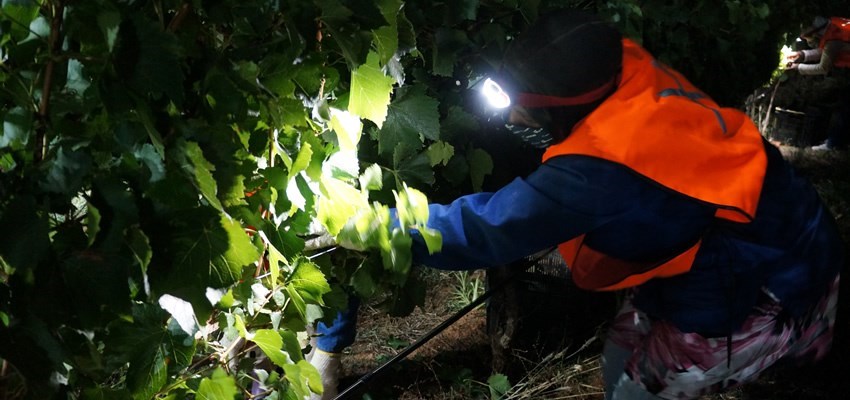From modest beginnings, based more on hopes and dreams than anything else, Cap Classique has grown to become one of South Africa’s leading wine sectors. Graham Beck, as a specialist producer, is proud to be one of the leaders in Cap Classique production.
30 years ago, Cellar Master Pieter Ferreira began the first vintage of Graham Beck Cap Classique under the stars. This was due to the fact that the new cellar roof was not yet completed. Now, for the first time, the 2021 vintage heralds back to Graham Beck’s origins.
“We are taking a bold step this year on our Estate in Robertson, to do a 100% night harvest. All pointers indicate that this will promote quality and is yet another step in our pursuit of the perfect bubble," shares Pieter.
Excitement was in the air when the Graham Beck vineyard team kicked off the very first night-harvest on Monday 11 January 2021 at precisely midnight. “The vineyard morphed into an extra-terrestrial scene… something out of Star Trek. With hundreds of headlamps flickering in the vineyards, it looked like a sparkle of fireflies on the move,” remarks Pieter. The first load of grapes was from a block of Chardonnay which was planted in 2017. The cool grapes arrived at the cellar, where our farm manager Pieter ‘Plaas’ Fouche kept to tradition, officially handing them over to cellarmaster Pieter ‘Bubbles’ Ferreira.
According to Pierre De Klerk, winemaker at Graham Beck, there are many wonderful benefits to harvesting under the moonlight: 'Picking at night is a massive benefit for both the grapes and the pickers thanks to the cooler temperatures. It also helps to concentrate the aromas and flavours for a better Cap Classique, as well as lower energy costs and increases efficiency in the cellar. We use less electricity as we do not have to cool the juice as fast. In addition, the presses won't need to run for 15-18 hours per day because farm grapes and purchase grapes will not arrive at the same time.’
With this year’s harvest season falling in the midst of a global pandemic and devastating bans on alcohol sales, the Graham Beck winemaking team looked to Mother Nature as their teacher for guidance. After all, when it comes to the cycle of new life, nature doesn`t wait for anything, and harvest must go on! With this in mind, and following on from an incredibly good winter with substantial rainfall, the team decided to go ahead with their first night harvest. In an area like Robertson where there are huge diurnal shifts in temperature between day and night of up to 20˚C (68˚F), a night harvest means the height of picking occurs when the vines are at their coolest - a welcome change for both the vines and the dedicated harvest team, and a reminder to work with nature, rather than against it!
Let’s raise a glass together to the 31st harvest of Graham Beck – may the 2021 vintage go from strength to sparkle. Let’s celebrate what matters and fly the South African flag high!
#InPursuitofthePerfectBubble #GrahamBeck #CapClassique #CelebrateWhatMatters #drinklocal #VintageUnderTheStars #PerfectedByTime #CapClassique50 #YourMomentInTheSpotlight

Benefits of night harvest
Quality parameters positively influenced by bringing in cooler grapes with night presses:
- Preservation of acid: Heat accelerates the precipitation of organic acids in grapes and juice and necessitates the addition of tartaric acid to juice - especially press juice
- pH will stablise faster: low pH is essential for good Cap Classique
- Preservation and protection of aroma and aroma precursor components
- Lower oxidation potential: Reduced amounts of additives such as SO2, PVPP, bentonite, etc.)
- AGV higher turgor pressure in the grapes will facilitate juice extraction and therefore we should reach our liter tipping point faster, as well as at a lower pressure
- Lower phenolic extraction that in turn will lead to reduced product additions to the juice and wine.